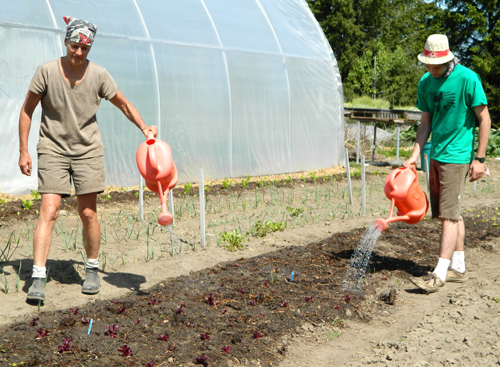
Watering can in hand, Martha Gay Scroggins strides along the gravel path. Behind her, the field slopes downhill towards the Arboretum, dotted with green seedlings in neat rows and edged with straw bales. Her son, Nicolas Scroggins, who is volunteering today, carries a flat of more seedlings out from the greenhouse, and she shows him where they need to be planted before pulling a clear plastic hose from a barrel and starting to fill the watering can.
“These barrels collect rainwater,” she explains, gesturing towards the row of reddish-brown barrels set up a few feet away from the greenhouse. The watering can full, she heads to a nearby row of green shoots to soak the soil.
“We’re very busy right now, transplanting plants from the greenhouse,” Scroggins adds without stopping what she’s doing. Indeed, she rarely sits or even slows down; as she works on one task, her eyes scan the field to see what needs to be attended to next.
Scroggins is the farm manager at the Guelph Centre for Urban Organic Farming (GCUOF), a small plot of land on the edge of the Arboretum, where a wide range of fruits and vegetables are grown without chemical fertilizers or pest control, and without mechanized vehicles or irrigation. It has been certified organic for four years.
Later this summer or in early fall, you may be able to enjoy some of the fruits (and vegetables) of Scroggins’s labour.
Much of the work is done by hand. The farm also uses a small amount of donated goat manure, and relies on the rain barrels (donated by Bill Barnett of Planet Bean) for water.
Until recently, at least. Graduate student Thomas Coleman has just completed the installation of a solar-powered pump to extract water from a well on the property that was dug thanks to connections made by Prof. Beth Parker, who is the NSERC Industrial Research Chair. The well is 126 feet deep, according to Coleman, who says: “When the sun is shining, the pump fills up a storage tank; a float in the tank turns off the pump when it’s done. It’s a simple and elegant solution to the problem of getting enough water to the garden.”
Scroggins’s assistant farm manager, Erin Richan, a U of G student in environmental science, started out as a volunteer. “I am quite committed to this project,” she says. “It highlights the potential for growing food in cities that is not recognized.” She works part time at GCUOF and part time at Backyard Bounty, a Guelph organization that plants, tends and harvests fruits and vegetables in city backyards.
If some additional funding can be found to keep Richan working at GCUOF, Scroggins hopes to offer fresh fruit and vegetables for sale to the University community in late summer and through the fall, as they did last year. Dates will be announced.
“We already have people hooked on our watermelons,” she says. Richan agrees – she says the watermelons were her favourite crop last year. But don’t expect to see them too soon. “We plant later in the year so that the food will be ready later, when the students are back,” explains Scroggins.
To ensure the food is ready, volunteers are needed to get the work done. A busload of students from the University of Mississippi, who were visiting the farm, helped to prepare a section of land for growing squash recently. Local volunteers can contribute on a regular basis and are always welcome: visit the farm blog at gcuof.wordpress.com or email gcuof@uoguelph.ca for information about volunteer activities and schedules.
Other regular visitors to the site include the children from the campus Child Care and Learning Centre, who make regular treks down the path to see what’s growing and watch the volunteers at work. “They think it’s their farm,” says Scroggins.
Scroggins is excited as well about her growing collection of seeds. “All our plants are open-pollinated, not hybrids,” she says. “As we get more seeds, we can start to be a supplier of certified organic seeds.”
The seeds and plants, though, are secondary in Scroggins’s plan for the farm. “We are growing food here, but our most important crop is new farmers,” she says. “The university students get the theoretical information in the classrooms up on the hill, but this is where they can get the hands-on experience and learn how organic farming really works.”